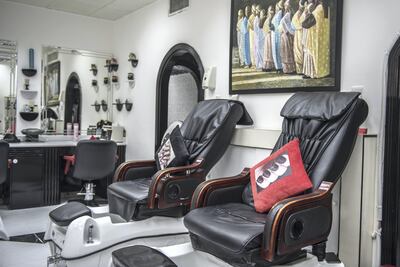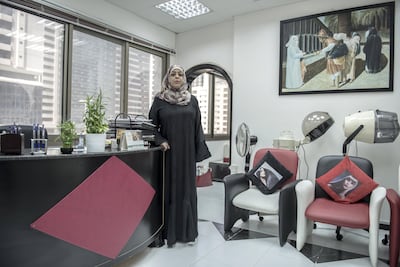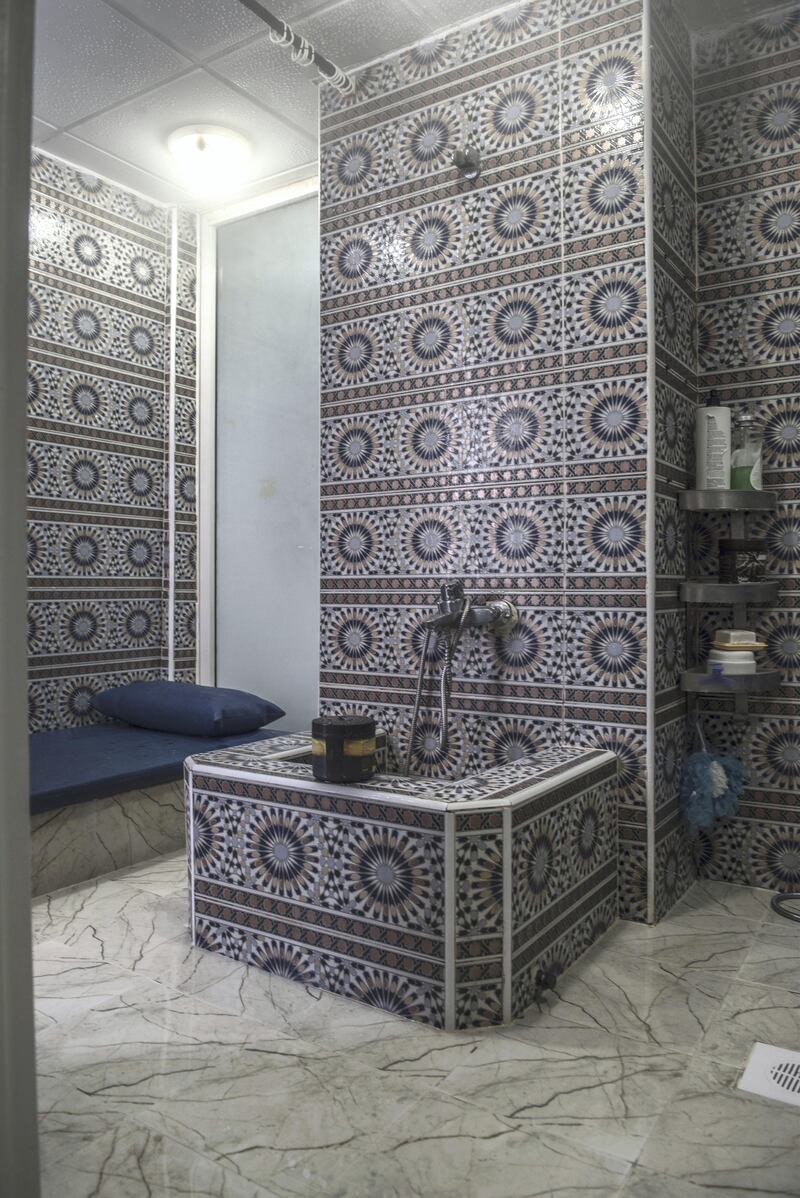The Naama Centre is in the most ordinary of Abu Dhabi buildings, a Hamdan bin Mohammed Street high-rise with ordinary ground-floor shops, such as Saleem Stationery and Barakat Legal Translation.
Its foyer smells of Old Abu Dhabi. The watchman's door is decorated with stickers of flowers and there are two plastic roses taped to its discoloured paint. Nearby, he keeps a table of plastic daisies, roses and orchids. A faded photo of the Kaaba hangs on the wall, taken at a time when the mountains around Makkah were unobscured by skyscrapers.
To this unremarkable building, women travel from Baniyas, Madinat Zayed and the Liwa, some making a six-hour round trip to visit a business hidden on the first floor: the Naama Beauty Centre, what is claimed to be the capital's first Moroccan hammam.

Abu Dhabi is not a city associated with bath houses, but hammams are all around us. Or at least above us. Walk down any downtown street and there are signboards advertising women's beauty salons on the mezzanine floor. A good number of them have Moroccan hammams within their walls.
Najat Bennis believes hers was the first. She has worked in this building since it opened in 1990, eight years after the landmark Hamdan Centre opened across the street and established the neighbourhood as Abu Dhabi's new commercial centre.
"It makes how long since I've been in Abu Dhabi? It is 36 years," she says. "I opened this 27 years ago and I've stayed in the same place ever since."
Her family moved to Abu Dhabi from Casablanca in the mid-1970s, when her father came to work for the military. "Even today there are many Moroccans who work in the police and the army," she says.
Bennis joined them when she finished her degree in economics, and worked office jobs before starting the salon with her younger sister, Naama.

Naama had studied at an institute in France, but struggled to find work in Abu Dhabi after her studies finished. The sisters saw an opportunity.
"The spas that existed were in hotels and they were mixed with men and women," Bennis says. "She couldn't accept that. She tried and tried to find work. So one day I said to her: 'Let's do it ourselves'."
She rented a furnished two-bedroom flat for Dh45,0000 in the heart of Abu Dhabi's new commercial district and named it after her sister.
In the early days, women came to the centre in secret, because they were shy about telling their families they were going to a Moroccan hammam.
"It was not easy for people to come in a salon and take off their clothes," Bennis admits.
This dynamic changed when she struck up a friendship with a young woman from Baniyas.
"You see, when one bride comes, she tells her friends." she says.
Today, the bath is integral to Emirati brides' wedding rituals and a regular part of women's beauty regimes.
Women come through the door all night, greeting Bennis with handshakes and news, before they are seated and served pre-treatment Moroccan tea and biscuits.
Meera Al Mansouri, 37, whose family are from Madinat Zayed, has been a regular since she first came with her mother as a young girl.
"There were people at the beginning saying it was shameful," Al Mansouri says. "Even today, there are some men who prefer that women do this at home instead of the salon, but women just love this.
"They love cleanliness and the baths. Bukhoor [perfume], Moroccan baths – these things are fundamental."
Her sister, Meitha, 30, agrees.
"The abaya makes your skin black and the bath cleans everything off."
"Now, in 2017, everybody does it," Al Mansouri says. "Now there are so many shops, but this one is the top. My sister, I tell you, it's like a natural treatment for the skin and it rids you of illness."
Among her other customers, Bennis has prepared three generations of brides from the same family.
"We are like family," she says. "If they feel unwell or have marriage problems, I feel ill myself. If there are weeks that go by without seeing each other, I feel something is missing.
"I love this country," Bennis, now 59, says. "It makes me feel very, very good. I go to France or Geneva, where my sister is, or Thailand, but I always come back here. I don't have anything in Morocco anymore."
Sheikh Zayed, the late president of the UAE, granted her father citizenship.
"It's for this that I say Sheikh Zayed, he was a president for everybody. He didn't distinguish between people.
"I would like to be buried here in Abu Dhabi," Bennis insists.
"If I die, don't take my body to Morocco, because I've been here for 36 years and that's more than half of my life."
_______________
Read more:
Inside the last DVD rental and cassette shops of Abu Dhabi
[ My barber: the constant in a city defined by change ]
[ Watch fixer of Hamdan Street has time on his hands ]
[ New public programme deciphers UAE through food, sport and music ]
_______________





